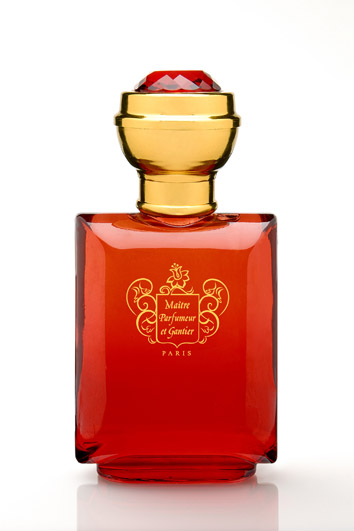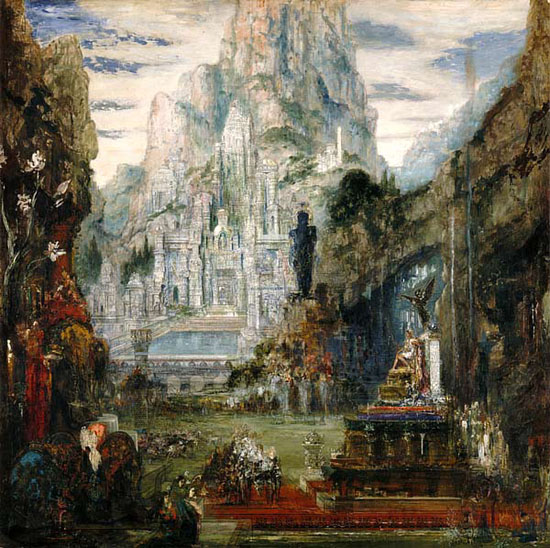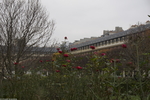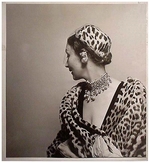Maître Parfumeur et Gantier Bois de Turquie (2008) {Perfume Review & Musings} {New Fragrance}

Bois de Turquie is the latest composition signed by Jean-Paul Millet Lage, the owner of Maître Parfumeur et Gantier. It is the first fragrance by the house since 1989 to be explicitly marketed as an unisex perfume - not just one by default like for niche scents in general - and is classified as a woody aromatic composition.
Despite its name which means "Wood from Turkey", its incense-y facet is more important than its woodsy one it seems as here sandalwood is made part of an incense-rich mix. "Woodsy" is a term that can be used in a more metaphorical sense to designate aromas like vetiver and patchouli and here it applies to patchouli.
A hitherto hidden woody violet note emerges in the end which tilts the balance more in the direction of a woody perfume. Complexity is the name of the game.
The scent aims to bridge the gap between the West and the Orient seeming to do so by resorting to references to an antique historic substratum located in Anatolia while inscribing itself in the Mediterranean geographical continuity.
Inspired by the Millet Lage's travels inTurkey, the scent is a shockingly beautiful fragrance offering both austere and sensual facets with an undercurrent of discreet gourmand notes marked by a somewhat religious quality.
The beauty of this perfume is such that it is able to provoke a genuine physical aesthetic emotion of poignancy and even suffering in the wearer. One feels choked at the throat, tears are ready to pour and one attempts not to give in to the strength of one's emotions.
Bois de Turquie perfectly illustrates the difference which exists between what is pretty and pleasing and what is beautiful and more difficult to bear.
In the experience of Beauty there is longing and the fear of loss while at the same time there is also the revelation of one's mortality and transiency. I will never be able to stand here for all eternity and drink from the source of this river for my thirst never will quench and the beauty that is contained in this place, person, or scent cannot last because all things and all sensations are meant to disappear.
The perfume shuns exoticism and a classically rendered Orient and prefers to turn to a mythical antique pagan Mediterranean landscape filled with protective deities.
The explicit "unisex" treatment of the perfume can be felt at one level in the contrast between austere, dry and voluptuous notes as mentioned above, but also more deeply between the opposition and marriage of paternal and maternal principles.....

This combination is deeply moving and awakens primal emotions in the wearer, this reviewer at least.
The first impression that strikes your nose when smelling Bois de Turquie more than the fresh opening is the soft amber-y (Labdanum or Cistus) and aromatic personality of the scent.Yet the citrus motif of the perfume is meaningful and in fact weaves further in the early development of the scent as next, a deliciously resinous and animalic impression with a raw-hide overtone deepens in the shade of lemon trees and cool balms. Later, the opening of the perfume will remind one of the sugary bergamot accord in Shalimar but it is well disguised.
As your mind travels to and rests for a time under balmy summery lemon trees, now it feels as if the breeze were blowing delicately in the morning by the Mediterranean sea thanks to a dash of mint and perhaps the suggestive power of aromatic herbs that are associated with the wind regularly stealing their scents.
The perfume becomes a bit powdery with a deepening leathery impression containing hidden, mysterious edible notes that soon evoke the vision of a propitiatory basket left on the altar in a temple and sheltering milky rice cakes yellowed by saffron as offerings to the gods.
Savory accents that were perceptible from the beginning become more marked and slowly evolve into a complex combination of marine, dry fish-like, almond-y, and salty musk impression.
The almond note now becomes more prominent, a bit doughy and like a cake of marzipan kneaded with the spices of the Magi and perfumed with the secret erotic concoctions mixed by temple priestesses.
There is something about Bois de Turquie that is reminiscent of the spirit of Guerlain Vol de Nuit, if not of its olfactive personality per se. Vol de Nuit exemplified for me this almost strange contrast between silent angular masculine notes and whisper-y sensual, supple feminine ones. While not marketed as an unisex fragrance by Guerlain it can easily be interpreted as such and reveals the same kind of intuition as contained in Jicky. Mitsouko, it can be argued, also carried this intrinsic indifference towards gender categorization as it was famously adopted by men such as Diaghilev and Charlie Chaplin. Vol de Nuit does not seem to have been recorded as much as a de facto unisex perfume, but Bois de Turquie reminds me of it in its balancing out of stony, dusty masculine notes and gourmand, nurturing feminine elements.
The plunge into a sea of incense that follows feels intoxicating making one think that one is drinking from a gold cup of wine macerated with myrrh and other precious substances.
The intensity of the incense and animalic accents dance a languorous and hieratic dance of love and meditation. It is at this point that the scent is beautiful to the point of being moving and strangles your throat with contained emotion. As the principles of controlled thought, rigor, and free sensuality combine, it approaches a mythical dimension evoking a world ruled and balanced out by paternal and maternal figures as reflected for example in those ruins of Seldjukid architecture in Anatolia where one can see the moon and sun figures carved into the stones of wind-swept, shell-like fragile laces of medieval palaces welcoming you at their entrances.
As the scent progresses, it now evokes the heavy blankets carried by nomads that would be filled with the scents of herbs, incense, spices and the subtle dust of their journeys
Another fragrance reference that comes to mind is Dior Dune. Bois de Turquie does not smell like it, but it makes one think of the initial shock experienced when smelling Dune for the first time in this discovery of the unlikely encounter of marine and incense notes. The laurel and amber in Bois de Turquie bring to mind Le Parfum by Lalique. Despite these points of comparison, Bois de Turquie is an original composition.
The dry-down develops a pleasant restrained pungency as if you had fallen asleep in a Mediterranean landscape and your cheeks were imprinted with the aromas of the herbs in a scorched landscape à la Pasolini while the scents make you travel to the sanctity of ancient temples revived in a dream from their ruins. The myrrh and the laurel are ancient and protective and caress you like the words of wisdom whispered to you by a book whose leaves are turned by the wind. The longer dry-down is subtle, softly balsamic and lemony as if the aromas were carried by a light breeze. The still longer dry-down is redolent of a woody violet then iris - it is a real, unusual beauty.
As an Eau de Toilette, it feels rich and complex while subsiding after a while and getting closer to the body. Lasting power is very good.
Bois de Turquie offers a beauty that corresponds to a symbolist aesthetic. It evokes the ancient golds with patina of a Gustave Moreau painting, the poetry of Saint John Perse, the prose of Julien Gracq in Le rivage des Syrtes in which one witnesses the "...rerouting of history as imperceptible and striking in its beginnings as the first shudder of a hull that glides onto the sea..." (cf. En Lisant, En Ecrivant)
Top notes are mandarin, orange blossom, bergamot
Heart notes are noble laurel, geranium, iris, jasmine
Base notes are sandalwood, myrrh, incense, patchouli
Bois de Turquie is an Eau de Toilette and is priced at 80 € for 100 ml. The bottle by Verreries Brosse has been slightly changed and made to look more broad-shouldered. It feels substantial and looks beautiful.
The fragrance will be available at the following locations from April 2008:
5, rue des Capucines - 75001 PARIS - 01 42 96 35 13
84 bis, rue de Grenelle - 75007 PARIS - 01 45 44 61 57
Printemps de la Beauté - 75009 Paris
Points de vente Consommateurs : 01 42 42 64 56









